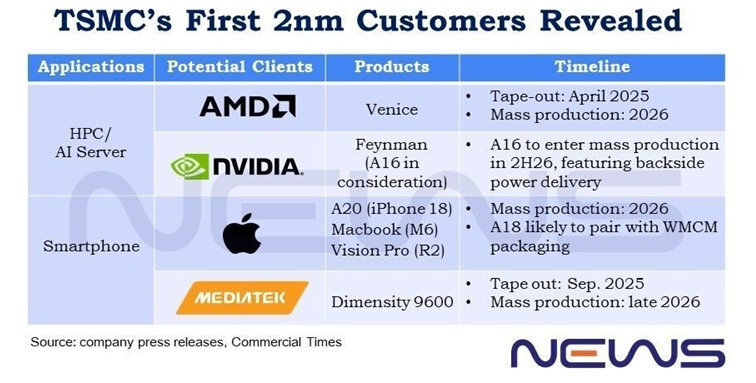Apple has locked in more than half of Taiwan Semiconductor Manufacturing Co.'s (TSMC) 2nm production capacity for 2026, according to industry reports. The move underscores Apple's strategy to maintain a technological edge across its product lineup, while highlighting growing competition among major chipmakers for next-generation nodes.
Apple plans to use TSMC's 2nm process for its upcoming A20 and A20 Pro processors in the iPhone 18 series, the M6 chip for MacBook Pro, and the R2 processor for the next-generation Vision Pro headset. At least two of these chips are expected to adopt TSMC's new wafer-level multi-chip module (WMCM) packaging, replacing the integrated fan-out (InFO) technology currently used in iPhone SoCs. WMCM offers greater flexibility in chip configuration, enabling more advanced system integration.

Beyond Apple, TSMC's early 2nm customers include AMD, MediaTek, and NVIDIA. AMD will use the node for CPU core dies in its Zen 6–based EPYC “Venice” processors, with tape-out completed in April and volume production set for 2026. MediaTek recently announced tape-out of its flagship Dimensity 9600 SoC on 2nm, with mass production expected in late 2026. NVIDIA, meanwhile, is preparing its next-generation “Feynman” GPUs, expected to move to a 2nm-class node in the second half of 2026, though it may adopt TSMC's more advanced A16 node with backside power delivery.
Notably absent from the 2nm customer lineup is Intel. The company continues to rely on TSMC's 3nm N3B process for compute tiles in its server and client CPUs but has signaled plans to transition its leading-edge products to its in-house Intel 18A and eventually 14A nodes, which feature RibbonFET and PowerVia technologies.
TSMC is expected to begin risk production of its 2nm process later this year, with full-scale mass production starting in 2025 and ramping into 2026.
+86 191 9627 2716
+86 181 7379 0595
8:30 a.m. to 5:30 p.m., Monday to Friday
